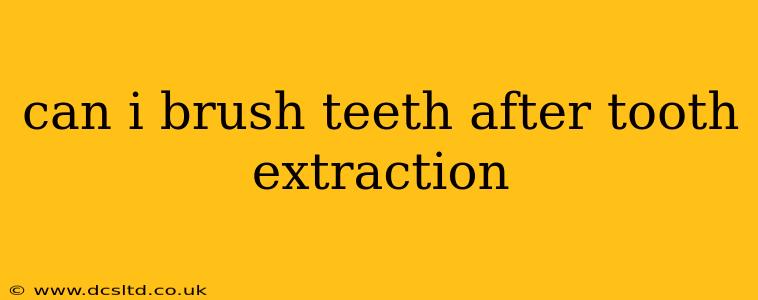The question of whether you can brush your teeth after a tooth extraction is a common one, and the answer is nuanced. While maintaining good oral hygiene is crucial, you need to approach brushing with caution in the immediate aftermath of an extraction. This detailed guide will explore the dos and don'ts, ensuring you heal properly and prevent complications.
When Can I Start Brushing After Tooth Extraction?
The crucial factor here isn't the when, but the how. You should resume gentle brushing as soon as the bleeding stops and the initial clotting process has begun, typically after 24 hours. However, avoid brushing directly on the extraction site for several days.
How Should I Brush After a Tooth Extraction?
This is where careful technique becomes paramount. You want to keep your mouth clean to prevent infection, but avoid disturbing the delicate blood clot forming in the socket.
- Gentle Brushing: Use a soft-bristled toothbrush and brush gently around the extraction site, avoiding direct contact. Focus on the other areas of your mouth to maintain overall hygiene.
- Rinse Gently: Use a saltwater rinse (1/2 teaspoon of salt in 8 ounces of warm water) several times a day to gently cleanse the area and promote healing. Avoid forceful rinsing, as this can dislodge the blood clot.
- Avoid the Extraction Site: For at least 2-3 days, completely avoid brushing or touching the extraction site. Let the blood clot form and remain undisturbed.
- Electric Toothbrushes: These can be used, but ensure you use the gentlest setting and avoid applying direct pressure to the extraction site.
What Happens If I Brush Too Soon or Too Hard?
Brushing too aggressively or too soon after a tooth extraction can lead to several issues:
- Dislodged Blood Clot (Dry Socket): This is a painful complication where the blood clot is dislodged, exposing the underlying bone and nerve endings. This significantly slows down the healing process and can require professional intervention.
- Infection: Poor oral hygiene can increase the risk of infection, leading to pain, swelling, and potentially more serious complications.
- Delayed Healing: Aggressive brushing can damage the healing tissues and prolong the recovery period.
What About Mouthwash After Tooth Extraction?
Similar to brushing, the type and use of mouthwash are important considerations after tooth extraction. Avoid using alcohol-based mouthwashes, as these can irritate the extraction site. Instead, opt for a gentle, alcohol-free mouthwash or stick to the saltwater rinse mentioned earlier. Always follow your dentist's specific recommendations.
When Should I Call My Dentist After a Tooth Extraction?
Contact your dentist immediately if you experience any of the following:
- Severe pain
- Excessive bleeding
- Signs of infection (pus, swelling, fever)
- Dry socket symptoms (intense pain, bad odor)
Regular communication with your dentist is key to ensuring a smooth recovery. They can provide personalized advice and address any concerns you might have.
Can I Use an Electric Toothbrush After Tooth Extraction?
Yes, you can use an electric toothbrush after a tooth extraction, provided you use it gently and avoid the extraction site. Opt for a soft-bristled brush head and the lowest setting possible.
How Long Does It Take to Fully Heal After a Tooth Extraction?
Healing time varies depending on the complexity of the extraction. It typically takes a few days for the initial bleeding to stop and the blood clot to form. Complete healing, where the socket is completely filled with bone, can take several months.
By following these guidelines, you can maintain good oral hygiene while allowing your mouth to heal properly after a tooth extraction. Remember, your dentist's specific instructions should always be followed for the best possible outcome. Proper care after the procedure is crucial for a speedy and comfortable recovery.
